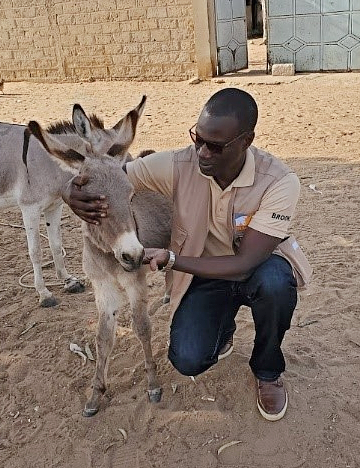Dr Mactar Seck, Programme Manager
Mactar is a veterinarian based in Dakar (our West Africa office). He is the country programme manager and research coordinator, and oversees the animal health, community engagement and advocacy teams.
Mactar presenting a study on the contribution of equines to the national economy at a conference in Dakar.

-
Animal welfare
-
Dairy cow nutrition
Qualifications
-
Veterinary surgeon (University of Dakar, Senegal)
-
Master of Science in Animal Sciences (University of Laval, Canada)
Publications
- D.S. Castagnino, M. Seck, V. Beaudet et al. (2016). Effects of forage family on apparent ruminal synthesis of B vitamins in lactating dairy cows.
- D.S. Castagnino, M. Seck, V. Beaudet et al. (2015). Apparent ruminal synthesis of B vitamins in lactating dairy cows fed diets with different forage-to-concentrate ratios. Journal of Dairy Science.
- M. Seck. (2012). Effets des facteurs alimentaires sur la synthèse ruminale des vitamines B chez la vache laitière. Master’s thesis. Université Laval.
- M. Seck, P. Y. Chouinard & C. L. Girard. (2012). Vos vaches laitières ont elles assez de vitamines? Le Producteur de Lait Québécois (Journal article).
Dr Seck was presented with a prestigious animal welfare award from the World Veterinary Association (WVA) and CEVA for his veterinary work with Brooke. He was one of five vets in the world to be awarded the World Veterinary Animal Welfare Award, held in front of a large audience during the World Veterinary Congress in Barcelona in May 2018. The award highlights Mactar's outstanding achievements within the veterinary profession in West Africa.
Hobbies
I enjoy sport and music.
Most memorable work moment
My most memorable moment was when I received the Animal Welfare award from the World Veterinary Association in Barcelona in 2018.
Dr Seck assessing the welfare of a horse in Senegal.
The best part is seeing how the owners’ change of attitudes towards animals and the improvement of service providers’ knowledge and skills is positively impacting equine welfare.
How did you get your job?
I applied after seeing an advertisement sent by the Veterinary College. At this time I didn't know anything about Brooke, but the job description I read piqued my interest. Indeed, I was familiar with the animal welfare topic as I worked a few years in the dairy sector in Canada, where the welfare standards are generalised. I started as Animal Welfare Officer for 3 years, during which I enjoyed spending time in the field implementing our service provision strategy. In 2016, I was promoted to Programme Manager, after an open selection process. The work and the responsibilities are different, but the passion in favour of alleviating equine suffering is stronger than ever.
